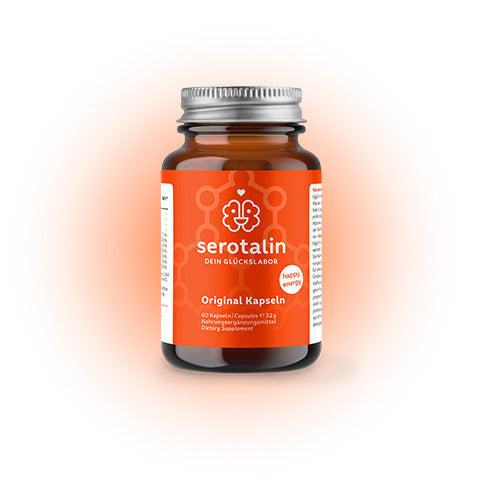In a bad mood? 4 natural mood enhancers

In a bad mood? 4 natural & over-the-counter mood boosters
Mood enhancers Serotonin | St. John's wort | 5-HTP | Omega-3 fatty acids | Vitamin D | Conclusion
In the case of a temporary low mood or mild depressive moods such as the winter blues, one does not have to immediately resort to antidepressants. There are other ways to counteract this mood-lifting effect. For example, with natural mood enhancers - available without prescription.
Well-known natural means for mood brightening are here for example valerian, St. John's wort, vitamin D or 5-HTP.
Such natural "antidepressants" are available without prescription as tablets, capsules or drops in pharmacies, drugstores and online. A major advantage of herbal mood enhancers over antidepressants is that they are not addictive. However, they are usually not free of side effects either.
Mood enhancer serotonin
Serotonin is often referred to as the "happy hormone" because balanced or slightly elevated serotonin levels are thought to influence emotions and mood.
In the brain, serotonin acts as an important messenger between individual neurons, performing important tasks.
- Regulation of information processes in the brain
- Metabolizes feelings (emotions) and drives - including the sex drive.
- Provides satisfaction and well-being (good basic mood)
If the happiness hormone serotonin is now present in the brain in too low a dose, then these processes and tasks become unbalanced. Low serotonin levels are associated with depression. The most commonly used antidepressants, selective serotonin reuptake inhibitors (SSRIs) and serotonin and norepinephrine reuptake inhibitors (SNRIs), work by increasing serotonin levels in the brain.
There are some factors that affect the production of serotonin: Plenty of sunlight, regular exercise, or even meditation.
Bananas, avocados, prunes or walnuts are among the foods richest in serotonin, i.e. they have a high proportion of L-tryptophan. A precursor of serotonin
Unfortunately, when it comes to serotonin-rich foods, "eating more does not lead to more effect"! Even if you eat large amounts of serotonin-containing foods, you will unfortunately not feel an influence on mood and well-being. The blood-brain barrier is responsible for this: the serotonin in the food is not allowed into the brain, so that serotonin-containing foods cannot significantly increase the serotonin level in the brain.
St. John's wort as a mood enhancer

The positive effect of St. John's wort on mood has been known since the Middle Ages. It is now assumed that the hyperforin contained in St. John's wort acts as a reuptake inhibitor of neurotransmitters such as serotonin, dopamine and norepinephrine. Thus, the degradation of these important neurotransmitters is slowed down and the serotonin level is naturally increased. A detailed scientific investigation of a total of 35 studies on St. John's wort efficacy in depression, concluded that in mild and moderate depression, St. John's wort medication was superior to placebo in combating symptoms. A similar conclusion cannot be made for severe depression based on the data. [1]
But watch out: St. John's wort captivates by a pronounced interaction of the plant with other drugs. The reason for this lies in the formation of certain enzymes, and it is precisely these enzymes that are involved in the degradation of many drugs. As a result, the drugs are broken down faster than they can act. So if you are taking medication, discuss taking St. John's wort with your doctor.
Mood enhancer 5-HTP

As a direct precursor to the neurotransmitter serotonin, 5-HTP also comes in handy for depressive moods and anxiety disorders. Scientific studies indicate positive effects of 5-HTP in depression. [2] 5-HTP cannot be ingested via food and must be supplied to the body via dietary supplements. As a direct precursor of the neurotransmitter serotonin, 5-HTP can quickly and easily enter the bloodstream and pass through the blood-brain barrier via dietary supplementation. Due to its proximity (direct precursor) to serotonin, it often proves more effective than its precursor L-tryptophan. Its natural occurrence has 5-HTP African black bean (Griffonia simplicifolia) Everything you need to know about 5-HTP can be read here.
Omega-3 fatty acids mood enhancer
Omega-3 fatty acids from fish, algae or nuts and seeds have been attributed almost miraculous effects on health. Recent studies underline their effect on the psyche.[3]
In particular, salmon, herring, mackerel and anchovies, but also flaxseed, walnuts, hemp and certain oils are known for their high content of the so-called omega-3 fatty acids.
Omega-3 fatty acids are necessary for serotonin to be produced in the brain. Simply put. So the more omega-3 available to your brain, the more serotonin can be produced
Fun Fact: In countries where fish oil consumption is high, doctors diagnose depressive illnesses less frequently than in countries where little fish is consumed. [4]
Vitamin D as a mood booster
Like omega-3 fatty acids, fat-soluble vitamin D3 supports serotonin synthesis in the brain.
The most important source of vitamin D is sunlight. Exposure to sunlight for 15 to 30 minutes a day is sufficient. For example, with a midday walk.
Of course, you can also take vitamin D through dietary supplements. This is especially useful when, for example, there is too little sunlight to produce vitamin D in the fall and winter.
Vitamin D can also alleviate the effects of seasonal depression. This is often triggered by a lack of sunlight combined with prolonged periods of darkness.[5]
Conclusion on natural mood enhancers.
The neurotransmitter serotonin lies at the heart of well-being and thus also of positive mood. A lack of serotonin leads to bad mood, listlessness, lack of concentration and many other negative symptoms. Natural mood enhancers all have an effect on serotonin levels in the brain. They promote serotonin synthesis and thus provide a brightening effect. All without a prescription and without the risk of becoming physically dependent. Since there may be interactions with medications, a consultation with the doctor is very useful.
Sources
[1] https://pubmed.ncbi.nlm.nih.gov/27589952/
[2] https://drive.google.com/file/d/179Zc98x6GZjgQmMYQuSyaNpTOWLCn8hq/view?usp=sharing
[3] https://pubmed.ncbi.nlm.nih.gov/12888186/
[4] https://pubmed.ncbi.nlm.nih.gov/11870016/
[5] https://pubmed.ncbi.nlm.nih.gov/18793245/



